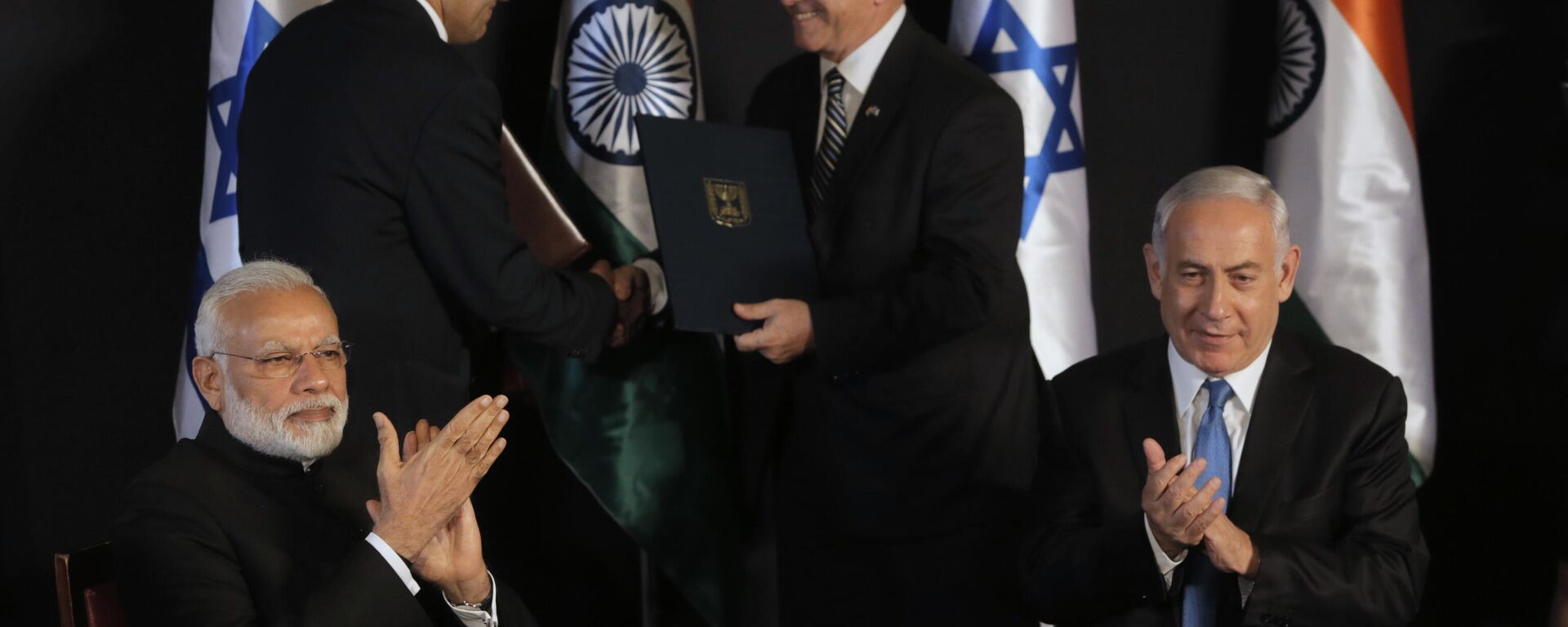https://sputniknews.in/20231011/does-the-israel-hamas-war-affect-india-pakistan-tensions-4751930.html
Does Israel-Hamas War Affect India-Pakistan Tensions?
Does Israel-Hamas War Affect India-Pakistan Tensions?
Sputnik India
As India and Pakistan stand on opposite ends of the Israel-Palestine conflict, Sputnik looks at the possible implications of the situation there on the ties of the two neighbors.
2023-10-11T20:29+0530
2023-10-11T20:29+0530
2023-10-15T10:55+0530
israel-hamas war
narendra modi
shehbaz sharif
india
pakistan
israel
hamas
x (former twitter)
taliban
delhi
https://cdn1.img.sputniknews.in/img/07e7/0a/0b/4755305_0:80:3008:1772_1920x0_80_0_0_b9c4dc8cc3790268d899ae548301c0c1.jpg
The contrasting stances of India and Pakistan on the growing hostilities between Israel and Palestine would not result in escalating tensions between New Delhi and Islamabad, a Pakistani geopolitical commentator has said. The comments of Dr. Zafar Nawaz Jaspal, director of the School of Politics and International Relations, at Pakistan's premier Quaid-i-Azam University in Islamabad, come in the wake of Pakistan taking the side of Palestine (read Hamas) and the Indian leadership expressing solidarity with Israel.New Delhi, Islamabad Poles ApartFollowing Hamas surprise assault on Israel on Saturday, Indian Prime Minister Narendra Modi termed the attacks on its territory as an act of terrorism. He reiterated his government's support for the Jewish state in its "difficult hour" during a phone call with Israeli leader Benjamin Netanyahu on Tuesday. Meanwhile, former Pakistan Prime Minister Shehbaz Sharif seemed to have backed the Hamas attack on Israel, though he did not mention the Palestinian military movement in his post on social media.Furthermore, he blamed "Israel's illegal occupation" for inciting the attack. "Ending Israel's illegal occupation, settlement expansion on Palestinian land, and oppression against innocent Palestinians are key for peace, justice, and prosperity in the region. I am not surprised by today's events," he wrote on X, previously known as Twitter.No Chance of Escalation of Tensions Between India, Pakistan In this light, Jaspal emphasized that Pakistan has always supported the formation of an independent State of Palestine.Having said that, Jaspal underlined that divisions between India and Pakistan on the matter would not escalate tensions in the neighborhood.India's Changed Stance on the ConflictInterestingly, like Pakistan, India has been a champion of the Palestinian cause, having backed the two-state solution to the hilt for decades. But with Hamas fighters killing children, the elderly, and even adolescents, the militant group's barbarism seemed to have played a part in the Indian response to the crisis.In this context, New Delhi-based West Asia analyst Fazzur Rahman Siddiqui, who is a research fellow at the Indian Council of World Affairs (ICWA), criticized the Pakistani statement, accusing Islamabad of always supporting terrorism. According to him, what Pakistan says or does is none of India's business now, as New Delhi has moved beyond Islamabad.Pakistan Backs Radical Groups, India Denounces All Forms of TerrorismHe stressed that what Pakistan is doing is in the context of its internal politics, where it wants to be seen as the champion of the Muslim cause, while India denounces terrorism in every form and everywhere in the world. He opined that what Pakistan is doing is part of their foreign policy ideology, as the neighboring country has supported terrorism for decades.
https://sputniknews.in/20231010/could-india-mediate-in-israeli-palestinian-peace-settlement-4724174.html
india
pakistan
israel
delhi
new delhi
islamabad
Sputnik India
feedback.hindi@sputniknews.com
+74956456601
MIA „Rossiya Segodnya“
2023
Pawan Atri
https://cdn1.img.sputniknews.in/img/07e6/0c/13/139630_147:0:831:684_100x100_80_0_0_8fa2b25903e7787fe6a2698552c167df.png
Pawan Atri
https://cdn1.img.sputniknews.in/img/07e6/0c/13/139630_147:0:831:684_100x100_80_0_0_8fa2b25903e7787fe6a2698552c167df.png
News
en_IN
Sputnik India
feedback.hindi@sputniknews.com
+74956456601
MIA „Rossiya Segodnya“
Sputnik India
feedback.hindi@sputniknews.com
+74956456601
MIA „Rossiya Segodnya“
Pawan Atri
https://cdn1.img.sputniknews.in/img/07e6/0c/13/139630_147:0:831:684_100x100_80_0_0_8fa2b25903e7787fe6a2698552c167df.png
india pakistan statements on israel hamas conflict, indian stand on israel hamas war, pakistan stand on israel hamas war, indian stand on israel hamas conflict, pakistan stand on israel hamas conflict, is pakistan supporting hamas?, is india supporting israel?, india to mediate in israel palestine conflict, can india broker peace between israel palestine, will india mediate between israel and palestine?, india to participate in israel palestine peace talks, can india assist diplomatically in the ongoing israel-palestine conflict?, israel-hamas conflict relevance for india, lessons from israel hamas conflict for india, israeli military equipment india, israel military equipment india, israel military hardware india, israel india defense cooperation, israel india defense ties, india israel defense relations, india israel ties, india israel relations, ukraine weapons middle east, urainian weapons middle east, ukraine weapons hamas, us weapons ukraine middle east, american weapons ukraine middle east, israel declares state of war, hamas militants, palestinian militant outfit, asked to remain vigilant, gaza strip, israeli army, israel air force, what is the issue between israel and palestine, does israel accept palestine, is palestine a country or part of israel, gaza strip, israel and palestine, hamas movement, indian embassy in israel, israel hamas war, hamas attack on israel, israel hamas war in gaza, israel hamas conflict gaza, iron dome system, iron dome system israel, iron dome system range, iron dome system specifications, iron dome system missiles, how iron dome system works, components of iron dome system, how iron dome system guards israel, how iron dome system protects israel, air india suspends tel aviv flights, air india cancels tel aviv flights, air india tel aviv flights, air india israel flights, state of war in israel, israel prime minister benjamin netanyahu,
india pakistan statements on israel hamas conflict, indian stand on israel hamas war, pakistan stand on israel hamas war, indian stand on israel hamas conflict, pakistan stand on israel hamas conflict, is pakistan supporting hamas?, is india supporting israel?, india to mediate in israel palestine conflict, can india broker peace between israel palestine, will india mediate between israel and palestine?, india to participate in israel palestine peace talks, can india assist diplomatically in the ongoing israel-palestine conflict?, israel-hamas conflict relevance for india, lessons from israel hamas conflict for india, israeli military equipment india, israel military equipment india, israel military hardware india, israel india defense cooperation, israel india defense ties, india israel defense relations, india israel ties, india israel relations, ukraine weapons middle east, urainian weapons middle east, ukraine weapons hamas, us weapons ukraine middle east, american weapons ukraine middle east, israel declares state of war, hamas militants, palestinian militant outfit, asked to remain vigilant, gaza strip, israeli army, israel air force, what is the issue between israel and palestine, does israel accept palestine, is palestine a country or part of israel, gaza strip, israel and palestine, hamas movement, indian embassy in israel, israel hamas war, hamas attack on israel, israel hamas war in gaza, israel hamas conflict gaza, iron dome system, iron dome system israel, iron dome system range, iron dome system specifications, iron dome system missiles, how iron dome system works, components of iron dome system, how iron dome system guards israel, how iron dome system protects israel, air india suspends tel aviv flights, air india cancels tel aviv flights, air india tel aviv flights, air india israel flights, state of war in israel, israel prime minister benjamin netanyahu,
The contrasting stances of
India and Pakistan on the growing hostilities between
Israel and Palestine would not result in escalating tensions between New Delhi and Islamabad, a Pakistani geopolitical commentator has said.
The comments of
Dr. Zafar Nawaz Jaspal, director of the School of Politics and International Relations, at Pakistan's premier Quaid-i-Azam University in Islamabad, come in the wake of Pakistan taking the side of Palestine (read Hamas) and the Indian leadership
expressing solidarity with Israel.
New Delhi, Islamabad Poles Apart
Following Hamas surprise assault on Israel on Saturday, Indian Prime Minister Narendra Modi termed the attacks on its territory as an act of terrorism. He reiterated his government's support for the Jewish state in its "difficult hour" during a phone call with Israeli leader Benjamin Netanyahu on Tuesday.
Meanwhile, former Pakistan Prime Minister Shehbaz Sharif seemed to have backed the Hamas attack on Israel, though he did not mention the Palestinian military movement in his post on social media.
Furthermore, he blamed "Israel's illegal occupation" for inciting the attack.
"Ending Israel's illegal occupation, settlement expansion on Palestinian land, and oppression against innocent Palestinians are key for peace, justice, and prosperity in the region. I am not surprised by today's events," he wrote on X, previously known as Twitter.
"What else can one expect when Israel continues to deny Palestinians their legitimate right to self-determination and statehood? What else, after daily provocations, attacks by occupation forces and settlers, and raids on Al-Aqsa Mosque and other holy sites of Christianity and Islam?" he added.
No Chance of Escalation of Tensions Between India, Pakistan
In this light, Jaspal emphasized that Pakistan has always supported the formation of an independent State of Palestine.
"But Indian Prime Minister Modi took a U-turn on Palestinian rights," he told Sputnik India on Wednesday.
Having said that, Jaspal underlined that divisions between India and Pakistan on the matter would not escalate tensions in the neighborhood.
"The conflict would not escalate tensions between India and Pakistan. But it would increase radicalized militancy in Islamic countries or nations with large Muslim populations," the Islamabad-based academic noted.
India's Changed Stance on the Conflict
Interestingly, like Pakistan, India has been a champion of the Palestinian cause, having backed the two-state solution to the hilt for decades. But with Hamas fighters killing children, the elderly, and even adolescents, the militant group's barbarism seemed to have played a part in the Indian response to the crisis.
In this context, New Delhi-based West Asia analyst Fazzur Rahman Siddiqui, who is a research fellow at the Indian Council of World Affairs (ICWA), criticized the Pakistani statement, accusing Islamabad of
always supporting terrorism.
According to him, what Pakistan says or does is none of India's business now, as New Delhi has moved beyond Islamabad.
Pakistan Backs Radical Groups, India Denounces All Forms of Terrorism
He stressed that what Pakistan is doing is in the context of its internal politics, where it wants to be seen as the champion of the Muslim cause, while India denounces terrorism in every form and everywhere in the world.
"It is for Pakistan to support Hamas, or the Taliban in Afghanistan but their policies or support to such militant organizations has no relation with India. Because New Delhi has its own independent strategic, political, diplomatic, and military autonomy," Siddiqui said in a conversation with Sputnik India.
He opined that what Pakistan is doing is part of their
foreign policy ideology, as the neighboring country has supported terrorism for decades.
"Moreover, India cannot confine its foreign policy to what Pakistan is doing or what it says as New Delhi cannot take its decisions through the prism of Islamabad," Siddiqui summed up.



